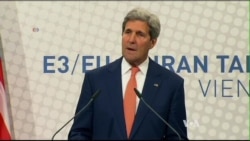U.S. Secretary of State John Kerry is heading back to Washington three days of talks with Iran in Vienna, as Iranian Foreign Minister Mohammad Javad Zarif called for extended negotiations if a deal with world powers is not achieved by the July 20 deadline.
Kerry said after the latest meeting on Iran's nuclear program Tuesday that diplomats from Iran and a group of six world powers have made progress in talks, but "very real gaps remain" on key issues.
Zarif echoed Kerry's sentiments, noting "serious differences" but saying they have "made enough headway to tell our political bosses that this is a process worth continuing."
Both diplomats stressed that meeting a Sunday deadline is still possible. Kerry also said there is "no question" that Iran has a right to a peaceful nuclear program.
"What we are trying to do is find a way for Iran to have an exclusively peaceful nuclear program while giving the world all the assurances required to know that Iran is not seeking a nuclear weapon," Kerry said. "I want to underscore: These goals are not incompatible. In fact, they are realistic. But we have not yet found the right combination or arrived at the workable formula."
During a break in talks, Zarif also described a willingness to continue seeking an accord.
"Iran has made a choice to engage," he said. "And we have shown in the last six months that, in spite of all the obstacles, we have lived up to our commitments. We are prepared to continue to do so and we have shown that we are a serious negotiating partner."
Iran's Supreme Leader, Ayatollah Ali Khameini, appears to have complicated the issue, recently declaring that Iran needs to increase its enrichment capability nearly 20-fold.
In the United States, some members of Congress say they won't vote to lift sanctions unless Iran gives up its enrichment capability. So even if the negotiators can find compromises, it will likely be difficult to convince some leaders back home, says Ali Vaez of the International Crisis Group.
"These negotiations are more informed by constraints of domestic politics than by real imperatives of national interest," Vaez said.
The United States, Britain, China, France, Russia and Germany reached an interim agreement with Iran last year that curbed its nuclear program in exchange for limited sanctions relief.
They have since been working on getting assurances that Iran is not and will not seek nuclear weapons, while Iran wants the repeal of international sanctions that have hurt its economy. Iran has long maintained its nuclear program is solely for peaceful purposes like power generation and medical research.
The Associated Press pointed out that, without a pact on nuclear talks, the United States would have fewer chances to negotiate with the Islamic Republic on urgent Mideast issues such as sectarian fighting in Syria and Iraq.
Secretary Kerry said if there is no accord by Sunday, the United States will assess the progress, and the prospects for more, and then decide whether to agree to an extension.













